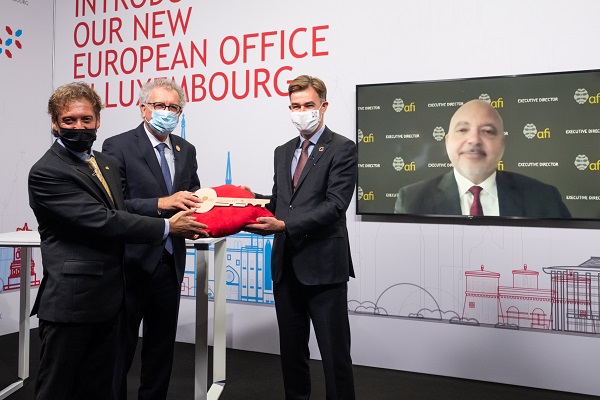 L-R: Ilya Sverdlov, Head for Europe and Global Partnerships at AFI; Pierre Gramegna, Luxembourg's Minister of Finance; Franz Fayot, Minister for Development Cooperation and Humanitarian Affairs; Alfred Hannig, CEO of AFI;
Credit: Tom Di Maggio
L-R: Ilya Sverdlov, Head for Europe and Global Partnerships at AFI; Pierre Gramegna, Luxembourg's Minister of Finance; Franz Fayot, Minister for Development Cooperation and Humanitarian Affairs; Alfred Hannig, CEO of AFI;
Credit: Tom Di Maggio
The Alliance of Financial Inclusion (AFI) has launched its Europe Representative Office (ERO) in Luxembourg City - the first office in Europe for the world's leading organisation on financial inclusion policy and regulation.
Strategically positioned to enable the expansion of AFI's activities in Europe, Caucasus and Central Asia, as well as in Africa and Latin America and the Caribbean regions, the ERO is expected to provide unique added value both to AFI's diverse membership of central banks, finance ministries and other financial regulators, as well as to Luxembourg's expansive financial inclusion ecosystem and that of the broader European community.
AFI Executive Director Dr. Alfred Hannig commented: "Our partners in Luxembourg and our organisation recognised each other for agility, efficiency but also adaptability with today's event taking place in both physical and virtual space, during the global pandemic and circumstances unlike ever before. Our work on financial policy and regulation is reinforced through the Sustainable Development Goals (SDGs) lens by incorporating considerations on inclusive green finance and gender inclusive finance".
Co-hosted by Luxembourg's Ministry of Finance and Ministry of Foreign and European Affairs, the AFI ERO's official launch ceremony was conducted virtually on Monday 5 October 2020 due to the ongoing COVID-19 health crisis. More than 200 participants from over 50 countries followed the event live on several platforms.
Luxembourg's Minister of Finance, Pierre Gramegna, and Minister for Development Cooperation and Humanitarian Affairs, Franz Fayot, welcomed the establishment of a systemic AFI presence in Europe as a means of deepening existing knowledge exchange and cooperation among financial regulators in developing and developed countries.
Minister Pierre Gramegna commented: "It is with great pleasure that Luxembourg welcomes the opening of AFI's European Representative Office. This new office will further strengthen Luxembourg's financial ecosystem and, above all, enable broader cooperation with all major stakeholders at the European and international level in the field of FinTech and green finance. In an increasingly connected world, only the constant exchange between regulators from different markets will allow us to effectively build a more sustainable and innovative finance that is accessible to all".
Minister Franz Fayot added: "Cooperation means exchange of knowledge, expertise and best practices. In that sense, engaging with the broader regulation community is crucial to promote true responsible and sustainable inclusive finance. Microfinance needs prudential norms different from those suitable for commercial banking and consumer finance. The important question is not whether to regulate, but how to regulate. In that sense, we look forward to an even closer relationship with AFI and its members over the years to come".
The ERO will bring tailored services and products to AFI's existing and potential membership in the region and enhance ties with its Europe-based stakeholders. The new office also aims to grow new and promising strategic partnerships and strengthen AFI's strategic communications, advocacy, and representational contribution towards reshaping the global policy architecture for financial inclusion.
The launch ceremony was followed by a high-level roundtable on converging topics in financial policy and regulation. Discussions focussed on emerging opportunities and risks of digital financial services to ensure truly inclusive and sustainable economic recovery as the world emerges from the COVID-19 pandemic. Financial inclusion needs of the most vulnerable populations, women and girls, forcibly displaced persons (FDPs), youth and those impacted by climate change were emphasised.
After the launch events, the Luxembourg government and AFI will co-host a virtual high-level joint learning programme on inclusive financial technology ecosystems and cybersecurity for the heads of AFI member institutions. The JLP, held on 6-8 October 2020 in cooperation with the University of Luxembourg, will guide leaders in making better informed decisions on designing an effective FinTech ecosystem, developing or enhancing their national cybersecurity frameworks and advancing inclusive green finance policies and regulations.








